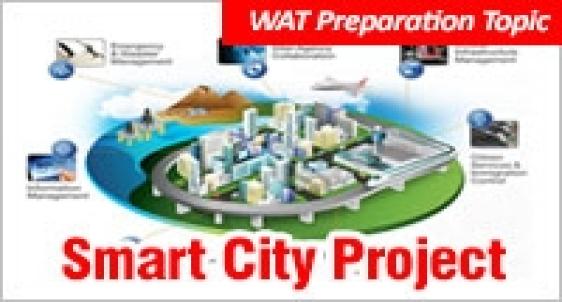
IIM Ahmedabad, Calcutta, Lucknow have already declared their short list of candidates for next phase of PGDM admission 2015-17 batch. IIMs have now started testing the shortlisted candidates on their Written Ability skills than testing them in Group Discussion exercise which does not have written exercises. IIM Ahmedabad, Calcutta, Bangalore and other IIMs have either added Written Ability Test as one of the key components of final admission round or have substituted Group Discussion by Written Ability Test.
Smart City Project in India is one of the current hot topics and in all probability one or other session on WAT in IIMs may ask the shortlisted candidates to write on this topic. Following is the model essay which can be attempted by a candidate in a time period of 20 minutes in the WAT exercise at one or other IIM or top rated B school.
The need of Smart City
Across the world, the stride of migration from rural to urban areas is increasing. By 2050, about 70 per cent of the population will be living in cities, and India is no exception to this fact. It will need about 500 new cities to accommodate the influx. Indian Prime Minister Shri Narendra Modi’s ambitious ‘100 smart cities’ project has been a subject of praise which when takes shape of reality will pave way to tremendous growth of India.
Smart city: The concept
A 'smart city' is an urban region that is highly advanced in terms of overall infrastructure, sustainable real estate, communications and market viability. It is a city where information technology is the principal infrastructure and is the basis for providing essential services to residents. In a smart city, economic development and activity is sustainable and rationally incremental by virtue of being based on success-oriented market drivers such as supply and demand. They benefit everybody, including citizens, businesses, the government and the environment.
In smart cities a number of services such as an e-governance portal, an emergency helpline, e-education, a smart-card enabling cashless retail transactions and recording of medical data for better treatment are present that facilitates the proper functioning of the system.
Smart Cities: Advantageous project
The 100 Smart cities in India are going to give a new shape and new recognition to India in the coming future. It will improve the pace of economic growth and can provide number of job opportunities to the new talents in the country. The Indian Prime Minister agenda of the “Skill Development” to the youths will gain success when this project starts taking its shape. The advancement towards new technology will drive more youths to learn and to earn their livelihood.
Looking into the background history it can be said that whenever the technology changes or there is a technological advancement the common thinking of the people changes accordingly. Gradually they adapt to it and get used to it. Thereby a skilled workforce will also become ready with the implementation of the smart city project.
The “Make in India” project will also boom when the Industrial Corridors such as DMIC, BMEC, AKIC, and CBIC will come into real picture. The development of these corridors will itself contribute a lot in the infrastructural and economical growth of the smart cities lying nearby these belts.
Smart City: Origin in India
Modi’s Smart City plan is part of a larger agenda of creating Industrial Corridors between India’s big metropolitan cities in India. These include the Delhi-Mumbai Industrial Corridor (DMIC), the Chennai-Bangalore Industrial Corridor (CBIC) and the Bangalore-Mumbai Economic Corridor (BMEC). It is hoped that many industrial and commercial centres will be recreated as “Smart Cities” along these corridors.
The Delhi-Mumbai Industrial Corridor (DMIC), which is spread across six states, seeks to create seven new smart cities as the nodes of the corridor in its first phase. There are several such smart city projects being undertaken across the country in places such as Dholera in Gujarat, Kochi in Kerala, Aurangabad in Maharashtra, Manesar in Delhi NCR, Khushkera in Rajasthan, Krishnapatnam in Andhra Pradesh, Ponneri in Tamil Nadu and Tumkur in Karnataka.
Smart City: Financial and Technological Assistance
Japan has offered a great volume of investment to the tune of $ 4.5 bn in India to develop smart cities in the first phase of the DMIC project through lending from the Japan International Cooperation Agency (JICA). Japan is also working closely with the government for the development of other industrial corridors. NDA government has opened the doors for the foreign investors to invest in India and contributes in the development of the smart cities in India.
IBM and Cisco are the technological partners in developing the smart cities. IBM and Cisco have prepared the Integrated Communication Technology (ICT) Master Plan for the smart cities under the DMIC project in the first phase.
Areas of Concern
Despite the projected dream of 100 Smart cities, there are several other issues which can put hurdles in the implementation of the smart cities project. A large amount of Capital is required to develop the smart cities and therefore needs to attract more and more foreign investment which is not an easy task. The government has to liberalize the trade and the other Industry reforms to attract the foreign investors.
The other biggest concern is over land acquisition. Most of these smart cities are being built ground up, on land currently owned by villagers who may not be open to a change of ownership or who may want a premium price. For example, the proposed smart city in Dholera, Gujarat, has faced resistance from the locals
The lack of the coordination between the various Government agencies and project execution are the other areas of concern. Apart from other challenges there is a need of change in the mindset and the segregation of the domain expertise and authorities, such as police, Municipal Corporation etc, with their own agendas and structured processes.
There are certain things that lower the expectations from the smart cities in India and it can be said that not all smart cities planned in India will have smart lighting and smart parking on first day. In case of India it will bring the education and healthcare in the homes of common people. So, it will not be fair to compare the features available in developed countries like Singapore or the US to what will be available here.
Implementation of project: Great need
In conclusion it can be said that the proper implementation of the Smart cities project will raise the living standard of the common people as well as it will contribute in the development of the Indian economy. The smart city project will place India among the top nations of the world. The Indian economy will then have great influence in the Global economy.
Hot WAT topics for the year 2014
WAT Topic for MBA: Ethics and morals cannot be taught in classrooms only
WAT Topic for MBA: Indo-US relations; how much beneficial for India
WAT topic for MBA: Indian polity has a better model for growth than China
WAT topic for MBA: Social Media is a waste of time
WAT Preparation Tips and Past trends in IIMs
WAT Topic for MBA: 2014 General elections will be a watershed for Indian democracy
WAT Topic for MBA: India`s 1.2 billion population is an asset for the country
WAT Topic for MBA: Corruption is the root cause of current economic and social woes in India
WAT Topic for MBA: India has more skilled Human Resource
WAT Topic for MBA: FDI in multi brand retail is a boon or bane
WAT Topic for MBA: Is ASEAN a defunct Group
WAT Topic for MBA: Essay writing; fasten your belts
Essay Writing and WAT in IIMs: Role, Importance and Weightage
Stay tuned to MBAUniverse.com for more updates on WAT 2015



























